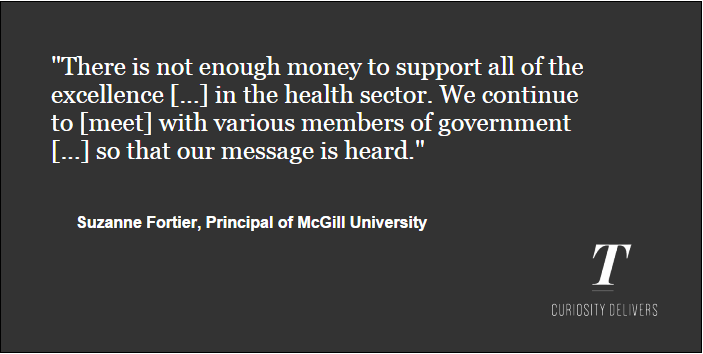Senate held its first meeting of the year and received reports on the medical program’s probationary status, biomedical research funding, and cases of sexual assault and harassment at McGill.
Undergraduate medical program probation
Dean of Medicine and Vice-Principal of Health Affairs, Dr. David Eidelman, praised the Faculty of Medicine’s response to the undergraduate program’s probation this past June, which came as a result of its failure to meet 24 standards of accreditation, including violations to student workload policies and failures to monitor curriculums.
“Senate will know that the faculty has been quite transparent […] and we have published online all of the documents […] from the accreditation bodies,” Eidelman said. “We quickly established a working chair that meets every two weeks to make sure that we have a response to every one of the components cited.”
McGill’s undergraduate medical program will submit its plan to address the issues cited by the accreditation bodies by December 2015, and submit new documents of accreditation in November 2016. The accreditation bodies will visit McGill in February 2017 to judge whether McGill has corrected the issues. Eidelman expressed confidence that McGill’s Faculty of Medicine would maintain their international reputation.
Annual report on the Policy on Harassment, Sexual Harassment, and Discrimination Prohibited by Law
Associate Provost (Policies, Procedures and Equity) Angela Campbell stated there were 23 reported cases of harassment in the last academic year, down from the yearly average of 36.
Arts Senator Erin Sobat asked if the decrease in reported cases of harassment resulted from a general lack of knowledge of McGill’s harassment policy. He cited a recent survey that suggested a rise in sexual assault complaints among McGill students, and expressed concern that students do not understand the reporting procedures.
“I am wondering if the decrease is sufficient to this whole process,” Sobat said, “[or] if [there is] a lack of knowledge of this process [and accessibility] to members of [the McGill] community”.
Campbell, however, warned against speculation. She noted that the decrease in reported cases of harassment could be a result of the policy’s proactive approach towards sexual assault awareness.
“It is not necessarily the case that there is less harassment – the policy [also] is pre-emptive so it aims to prevent harassment,” Campbell said. “There is an increased sensitivity to issues with respect to harassment. I don’t think it is fair to say that a rise in sexual assault complaints would trigger […] a rise in complaints in harassment [in general]; someone who is sexually assaulted would not want a discrimination and harassment [complaint].”
The future of biomedical research in Canada
Faculty of Medicine Senators Terrence Hebert and Dan Bernard voiced concerns over the new Canadian Institute of Health Research (CIHR) Foundation funding scheme for biomedical research, piloted in mid-July.
“Though CIHR committed to […] 450-600 [transitional open operating grants programs] proposals, only 383 grants were ultimately awarded, and each endured a budget cut of almost 30 per cent,” Hebert and Bernard wrote in their question to the Senate. “Unfortunately, these numbers cannot be construed as anomalies.”
McGill Principal Suzanne Fortier disagreed with Herbert and Bernard, arguing that funding had flatlined.
“I, with all due respect, do not agree,” Fortier said. “From all I have seen from the data I don’t believe they have had a steep decline, [rather] they have not had an increase.”
Fortier stated that the Canadian medical sector at large does not have enough funding.
“There is not enough money to support all of the excellence […] in the health sector,” she said. “We continue to [meet] with various members of government […] so that our message is heard.”
Hebert advocated a proactive response to what he sees as a funding crisis in Canada.
“We have to go at the real problem which is […] a steep decline [in funding] in the last couple of years,” Hebert said. “How do we transmit that message to a broader audience, […] what is McGill going to do if we cannot improve that?”
Herbert also expressed concern about the impact on faculty members.
“Young faculty are expected to develop an independent research program, but all the funding seems to be tailored towards […] industry driven and government priority type research,” Herbert stated. “The funding situation should be taken into consideration when evaluating our young faculty.”
Fortier, however, said that she wanted to compile and analyze more data that will inform the discussion on research grants.










To clarify, the survey I cited was the December 2014 Student Health Survey (https://www.mcgill.ca/studenthealth/files/studenthealth/mcgill_ncha_report_dec_2014_final.pdf), which shows that the actual proportion of students experiencing harassment and sexual harassment is definitely higher than those actually accessing the university policy (despite preventative measures). Unfortunately I misspoke when using the term “sexual assault” rather than “sexual harassment,” and thus the Associate Provost’s response went in a different direction than I had hoped.